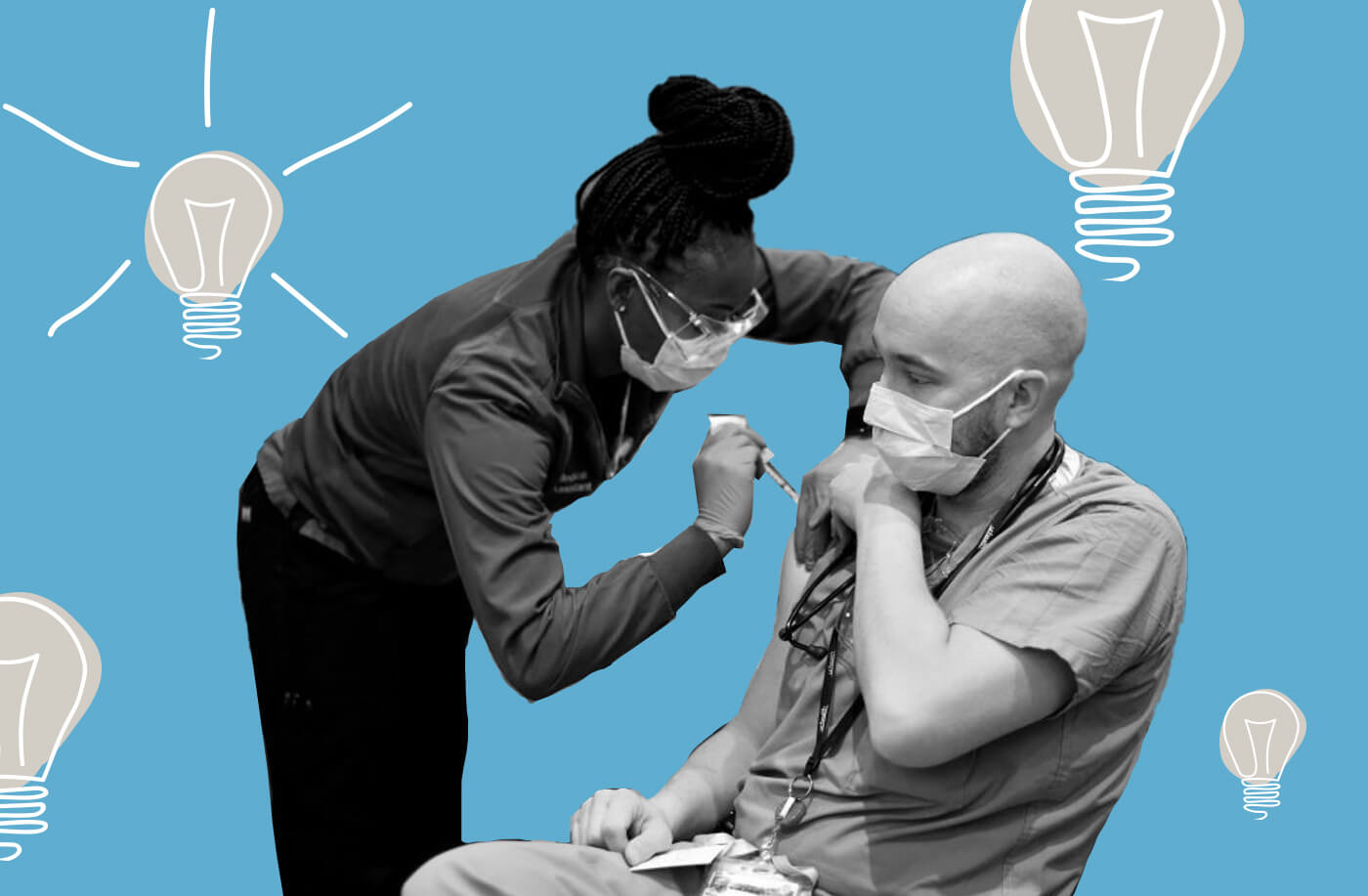
Medical assistant Shalice Wheeler, left, administers Covid-19 vaccine to physician assistant Matt Ferraro at UCHealth University of Colorado Hospital in Aurora, Colorado on Thursday. December 17, 2020. (Photo by Hyoung Chang/MediaNews Group/The Denver Post via Getty Images; Graphic by Rebecca Russ/COURIER)
Plus what makes an mRNA vaccine different and how there are more doses of the Pfizer vaccine than expected.
The first coronavirus vaccine has already been administered to thousands of Americans, and a second one from Moderna may get approval from the Food and Drug Administration in the next few days. Below we break down all the facts you need to know about the first week of the vaccine roll-out.
Allergic Reactions to Vaccines Are Rare (But Side Effects Are Normal, Too.)
Two health care workers in Alaska developed allergic reactions in the minutes after receiving Pfizer’s COVID-19 vaccine this week. That may sound scary, but reactions to vaccines are normal and happen in vaccines that have been around for decades. They can be as mild as arm soreness and redness around the injection site or more severe, like an allergic reaction. But serious side effects are extremely rare. In Pfizer’s 44,000 person trial of the coronavirus vaccine, a total of 137 people experienced allergic reactions, or about 0.63%.
The FDA weighed the risks and benefits of the vaccine before approving it for use in the United States and found the benefits easily outweigh the known and potential risks. Pfizer’s trial found the vaccine was about 95% effective at preventing COVID-19, and they did not encounter any serious adverse effects.
Experts agree that the proper protections were already in place as the vaccine is being administered. For instance, guidelines require patients to remain in the hospital or medical center for 15 minutes after getting vaccinated in the event of any adverse reactions. That guideline was followed in the two cases in Juneau, Alaska this week, and in the United Kingdom.
What Is mRNA and How Is It Different From Other Vaccines?
Both the Pfizer and Moderna vaccines work in a new way to protect people from contracting COVID-19. Traditionally, most vaccines use a weakened or dead version of a virus to get the body to produce the antibodies needed to fight.
An mRNA vaccine is different, because it uses messenger RNA as a blueprint to instruct the human body on how to create a protein related to COVID-19. That then allows the body to build antibodies to fight the virus. Once injected, the body can begin to recognize that the vaccine is carrying materials it needs to fight and begins building an immune response and creating antibodies. Then the body’s own immune system will be able to recognize and fight off the coronavirus.
FDA Says Extra Vaccine Doses Good To Use
As the first doses of the Pfizer vaccine were administered this week, some medical personnel noticed that the glass vials used to transport the vaccine hold more doses than they expected. Guidelines show that each vial should contain five doses of the vaccine, but after preparation they contained six or even seven doses.
The FDA issued a statement Wednesday saying that it’s okay for medical workers to use the extra doses and that it’s common for vials to be filled beyond the measurement on the bottle. The extra doses are an instance of good news because it means more people can be vaccinated in this first wave of inoculations than previously thought.
Politics

Democratic shakeup in Virginia primaries for governor, lieutenant governor
Richmond Mayor Levar Stoney quit his bid for governor and jumped into the race to be the Democratic nominee for lieutenant governor. The race for...

New Biden rule protects privacy of women seeking abortions
Under the new rules, state officials and law enforcement cannot obtain medical records related to lawful reproductive health care with the goal of...
Local News

Virginia verses: Celebrating 5 poetic icons for National Poetry Month
There’s no shortage of great writers when it comes to our commonwealth. From the haunting verses of Edgar Allan Poe, who found solace in Richmond's...

Join the fun: Recapping Family Literacy Night’s storybook adventures
When’s the last time you read a book aloud with a loved one? If it’s difficult to answer that question, then maybe it’s time to dust off that TBR...




